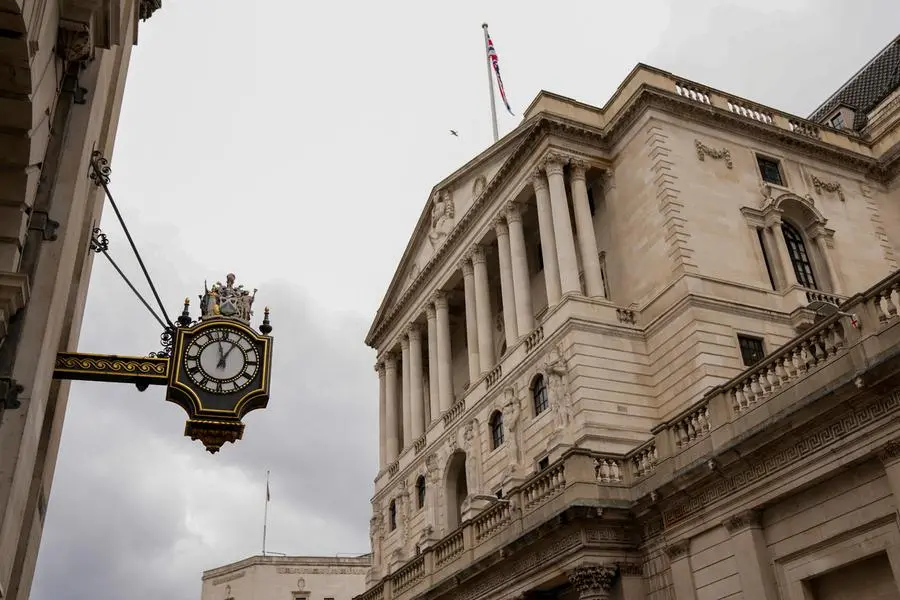PHOTO
LONDON - The Bank of England's first interest rate cut since 2020 hangs in the balance next week, with greater uncertainty than usual as key policymakers have not spoken publicly for more than two months due to rules in the run-up to July 4's election.
Investors are left guessing whether recent higher-than-expected services prices are enough to prevent the central bank cutting rates from their 16-year high of 5.25%.
Interest rate futures show a 50% chance of a quarter-point rate cut on Aug. 1. And while most economists in a Reuters poll still expect a cut, many would not be too surprised if the BoE instead waited until its following meeting on Sept. 19.
"We've run out of ways to describe how close the decision next week will be," RBC Capital Markets global macro strategist Peter Schaffrik and senior UK economist Cathal Kennedy wrote in a note to clients on Thursday.
Last month, the BoE's Monetary Policy Committee voted 7-2 to keep rates on hold, but minutes of the decision recorded that it had been a "finely balanced" decision for some of the policymakers who had not voted for a cut.
Governor Andrew Bailey, in a written statement alongside June's decision, said policymakers "need to be sure that inflation will stay low" before cutting rates.
Financial markets see only gradual loosening, with two quarter-point cuts expected this year and a further three or four cuts in 2025, reducing rates to 4% or just under.
Consumer price inflation has been at the BoE's 2% target in May and June, down from 6.7% when the BoE last raised rates in August 2023 and lower than in the United States or the euro zone, where the European Central Bank cut rates in June.
But in the short term this may be as good as it gets for the BoE. Both it and most external economists expect inflation to rise in the coming months as the downward pull of sharp falls in energy prices last year drops out of the annual price index.
UNDERLYING PRICE PRESSURES
The BoE has said its rate cut decision will be focused on underlying measures of inflation pressure: chiefly wage growth, labour market tightness and services prices.
Since June's rate decision, the job market has eased, with fewer vacancies and slightly higher unemployment.
Wage growth has also slowed - though at 5.7% in the three months to May it was still roughly double the rate the BoE views as compatible with 2% inflation, and on track to be just above the BoE's expectation for the second quarter.
But the big outlier is service price inflation, which at 5.7% in June was well above the BoE's 5.1% forecast.
Much of this overshoot was due to unusually high hotel prices, possibly related to concert tours that month.
But the extent to which MPC members will discount this reading is unclear.
Of the four who have spoken publicly since the BoE lifted its self-imposed election campaign restrictions, only Chief Economist Huw Pill is regarded as a swing voter.
Pill said an August rate cut was "an open question". Wage inflation and services prices showed "uncomfortable strength" but even so, inflation pressures might be beginning their path back to tolerable levels, he said.
Particular uncertainty surrounds the views of deputy governors Clare Lombardelli and Sarah Breeden. Lombardelli joined the BoE this month after spending most of her career at the finance ministry and Breeden's last substantive comments on monetary policy were in February.
Unexpectedly strong economic growth in the first five months of 2024 might reduce any urgency felt by the MPC to cut rates.
RBC expects the BoE next week to revise up its 2024 growth forecast to 1% from May's prediction of 0.4%, which followed an expansion of just 0.1% in 2023 as Britain struggled with a surge in energy costs after Russia's full-scale invasion of Ukraine.
However, James Smith, developed markets economist at ING, said it would be risky for the MPC to seek too much certainty that inflation pressures were buried.
"Decent growth for the rest of 2024 relies, in part, on those cuts being delivered, a fact that won't have been lost on BoE officials," he said.
(Reporting by David Milliken; Editing by Kevin Liffey)





















